I cannot take credit for that phrase; unfortunately, as it is quite commonplace here in Curry County. As it should be, though – this place encourages a relaxed-yet-somehow-also-adventurous lifestyle with its numerous hiking trails, secret coves, breweries, thriving rivers, and gorgeous sunsets. As stated in my last post, Dustin and I are here staying at the Port Orford Research Station to shadow two photographers from Portland, Justin and Erik, as part of the South Coast’s media asset building project. South Coast expert Dave Lacey (owner of South Coast Tours) took us around to his favorite spots to partake in various outdoor activities for Justin and Erik to photograph. We essentially ended up being their outdoor recreation models while also shadowing them throughout the trip. It was a fantastic learning experience, as we got to ask them all the questions we liked about photography and the industry, equipment, freelance work, life, etc., all the while paddle boarding in the clearest creeks and over bait balls in the ocean, jumping off boulders into the Chetco river with steelhead fry swimming underneath us, catching newts, tide pooling, drinking local beer, and chasing sunsets. It was definitely one of the best experiences I was fortunate enough to have. I ALSO SAW A RIVER OTTER FOR THE FIRST TIME ON THE VERY FIRST DAY OF SHOOTING. The trip could’ve ended there and it would have been a-okay.
Staying at the Research Station has been fantastic as well. There is something special about staying in a place that is primarily used by scientists, especially one on the coast near a marine reserve. To put it simply, this is the kind of thing I signed up for. For example, there are rockfish illustrations adorning the walls and books about Oregon coast hiking and marine biology filling the bookcase in my room. There’s also a frozen marbled murrelet in the freezer that has, according to Erik, been there waiting for an Audubon guy to pick it up since Erik was there last. Gross, but it honestly warms my heart. For science, right?
When expressing my interest in sperm whales, the station manager, Tom Calvanese (who is also a marine biologist, diver, rockfish researcher, and the Port Commissioner) lent me Bryant Austin‘s book, Beautiful Whale. Austin created the first ever high-resolution, life-sized composite images of humpback, sperm, and minke whales, and the book chronicles the dramatic story of how he did it.
I devoured that thing in one morning (okay, it’s relatively short, but still). I want to include a passage from the book here because it describes my sentiments about the species so precisely. When describing how it feels to meet the gaze of a whale within six feet, Austin says,
“It is disturbing, because this whale is challenging me to reevaluate our perceptions of intelligent, conscious life on this planet. And that which is challenging these perceptions may also disappear in our lifetimes. What compels me most of all is the thought of losing over five million years of evolving culture and communication in the largest brain ever to exist on Earth, and never to have understood it.” (He’s talking about sperm whales, whose brains are the largest of any creature and have been evolving for over five millions years). “Carl Sagan once said, ‘We are a way for the cosmos to know itself.’ We, being the self-aware cosmos, will lose a significant part of ourselves should we allow these creatures to go extinct.”
Tom also told me about a group of whale researchers who will be staying at the research station for the rest of the summer starting tomorrow. They will be tracking whales along the South Coast as part of a larger research project concerning whale excretion, prey, and ocean acoustics; I will hopefully get to meet them this summer. After seeing James Nestor’s Bioneers speech about Darewin and sperm whales a few months ago, I’ve been reading his book Deep and have been very interested in the creatures since. The plan is to someday become a free diver, join James and Darewin, communicate with the whales, and change the world. Just kidding. (But maybe). Also, sperm whales have learned to take sablefish (black cod) off of commercial long lines in the Gulf of Alaska and other places with their extremely dexterous jaws. This depredation is a huge problem for fishermen as black cod is an extremely marketable (and declining) species of fish, and it has caused significant economic loss for fishermen. Watch this eerie video of it happening. The clicks you hear are the whales.
The whales have begun to learn that the acoustics produced by the engine slipping in and out of gear while the fishermen haul the lines up mean that they get a free meal. Southeast Alaska Sperm Whale Avoidance Project is a group of scientists, fishermen, and fisheries managers working together to understand this issue and develop solutions to decrease the interactions while maintaining both whale populations and fisheries.
Being at the research station has been so enriching – learning about whales, getting to know the fellows next door at the Port Orford Sustainable Seafood office, receiving professional and project management advice from Tom (thanks Tom), running early on the beach, cooking delicious meals (thanks fully equipped kitchen), and posting up at sunset upstairs to catch the view.
Above & below: the view from my room.
We also got to know a BEAUTIFUL retired British couple who lives in Port Orford; Rowland is kindly donating some gorgeous wildlife photographs to our project. They took Dustin and I on a wonderful hike and they had us laughing the whole time while they lovingly bickered, told wild stories, and skillfully identified species of plants and insects.
I’d love to live here someday. I didn’t get the chance to see everything, but the people, the views, and Olivia the toothless cat at Tasty Kate’s were enough to get me hooked. Until next time, Port Orford! Here are some more pictures of the adventure (and four rolls of film in the near future. I don’t care what you say Rowly, film is better).
Above, left to right: Justin, Erik, Dustin.
Above: Very tiny Justin, Dave, Mark, and Dustin.

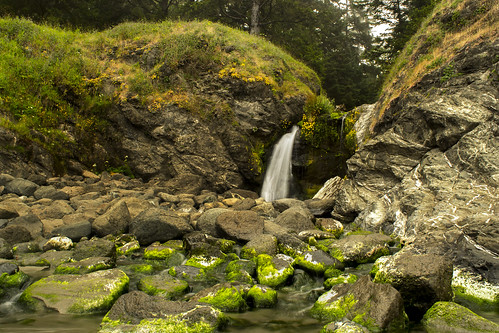


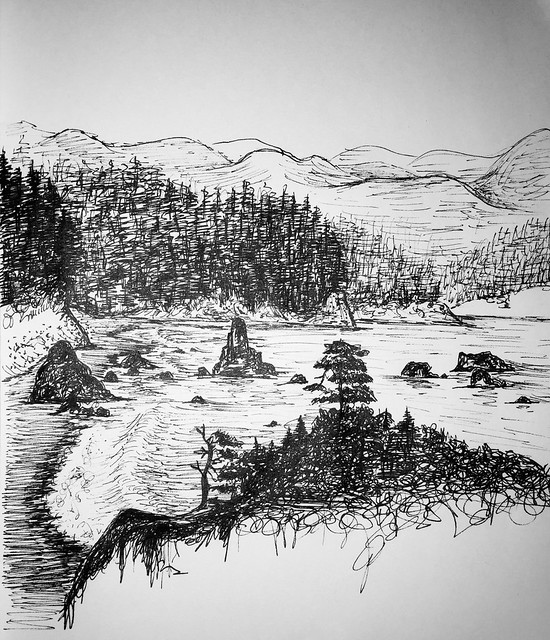

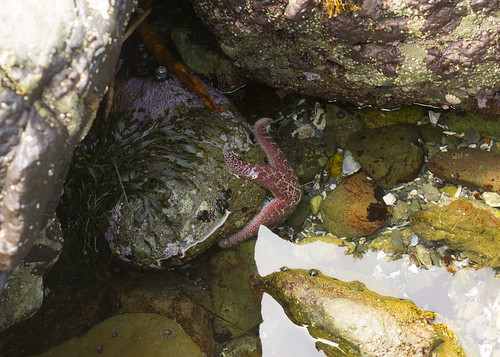
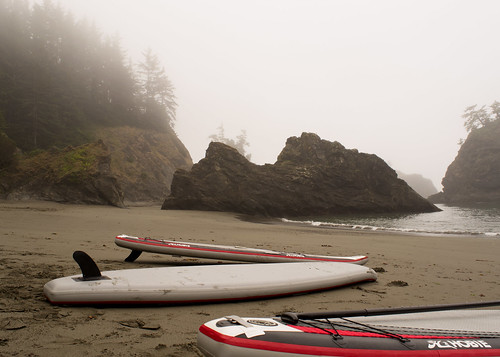
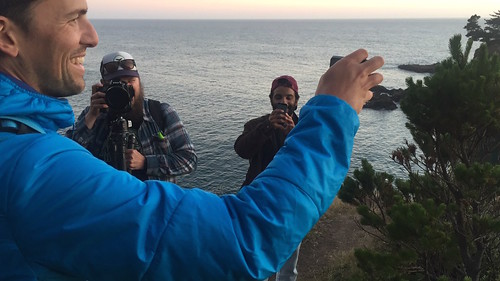



Sounds like you’re having a blast down in Port Orford! Congrats on the river otter! Super fascinating video and information on the sperm whale and how they’ve been interfering with the fishermen’s catch up in Alaska. I’m very curious to see what they do to resolve that.